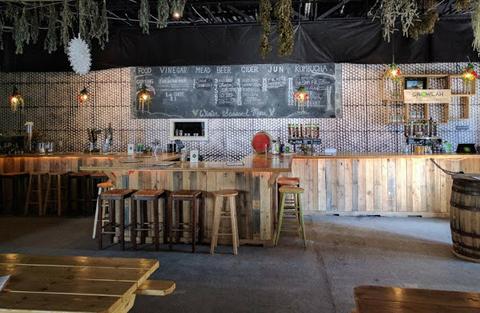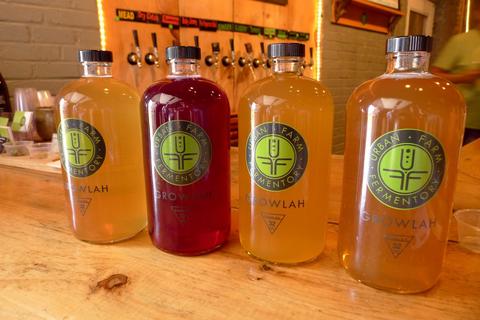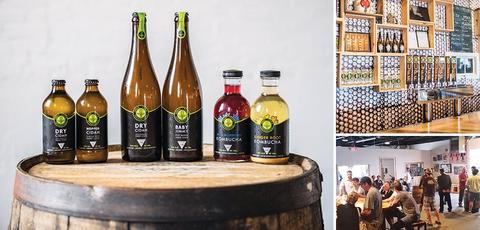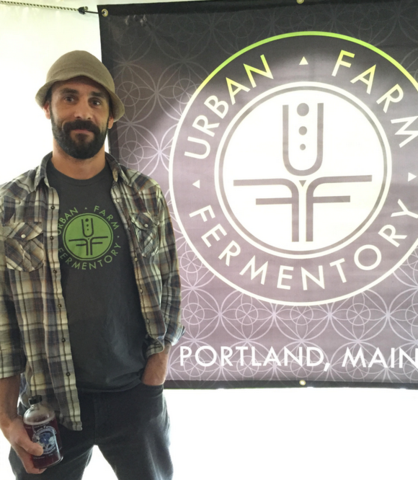"There really isn’t a place quite like what we’re doing": An Interview with Fermentation Visionary Eli Cayer

Urban Farm Fermentory in Portland, Maine might be onto something. Combining beer, cider, mead and kombucha under one roof could very well be the next big movement in the adult beverage world. In a locally focused craft beer world, Eli Cayer, Founder of UFF takes it a step further by not only sourcing ingredients locally, but actually foraging (that’s right, foraging) for local herbs, plants and berries in and around Portland. Sure, maybe the .5% - 2.5% ABV kombucha won’t be the next alcohol darling, but with its ever growing popularity over the past decade, it certainly may deserve a tapline at certain breweries and brewpubs.
We had an excellent discussion with Eli about his thoughts on the potential popularity of these fusion-type breweries, the path he took that eventually led to UFF, and various avenues for the future, including more UFFs in metro areas across the country! Let’s dive in.
Box Brew Kits: We heard that you started with fermentation a bit non-traditionally by brewing mead. How did this eventually lead to Urban Farm Fermentory?
Eli Cayer: I was a beekeeper by chance, and actually opened up a meadery in Portland. I had it for about three years before I opened UFF. I really liked beekeeping and had a lot of honey, and liked the farming aspect of managing bees. And that just sort of evolved over time. I got interested in mead and fermentation and then people started finding out. And I know so much more today about foraging and herbs and fermentation because people who just know more than me show up and are excited to talk about a place that’s focusing on all things fermented. When the opportunity arises you just have to roll with it. That opens up another door, and you roll with that one and keep it going as long as you’re having a good time and making a living.

Growlah's filled with different flavors of kombucha at Urban Farm Fermentory in Portland, Maine.
BBK: So what was the reasoning behind creating a brewery that not only had mead, but beer, cider and kombucha on tap as well?
EC: UFF was built on two things primarily, above and beyond fermentation, and that was foraging locally, and that the things you’re ingesting are good for you, whether you know it or not, or whether you care or not. I want people to come in, but at the end of the day, I just want you to enjoy it. The intent is to increase the wellbeing of the consumer: whether it’s through medicinal ingredients or just getting a nice buzz on and having a good time with friends. If you’re having a better time in life because of the things that you pick up from us...that’s the ultimate goal.
BBK: Do you think these types of “fusion breweries”, state laws permitting, will become more and more popular? Or do you think you just found a workable niche in Portland?
EC: There really isn’t a place quite like what we’re doing. There’s obviously a big brewery push, and that tends to be guys that want to make great beer and come up with fun names and makes flashy cans and that sort of thing, which is cool. Cider is doing great things which is great coming from more of a farm background, but is pushing into the craft beer scene as well. And kombucha is strictly this health beverage for the most part, but we’ll see what happens when people start to figure out that there’s a little more alcohol in there than there should be for a “non-alcoholic” beverage”.
But coming back to your original question, I don’t know if things like this are going to pop up more, but it was always my intent to do it this way. I mean, UFF isn’t really about Portland, Maine. It’s more of a pilot program in a lot of ways to map out the different flavors using different ways to ferment.
BBK: You mentioned foraging locally. How did foraging become one of the pillars UFF was founded on? And how do you even have time to forage in and around Portland?
EC: Growing up as a kid we would always go out and pick blueberries and hazelnuts, and I love being out in the woods too. The company was definitely built on the idea of foraging. It kind of builds excitement too when there are these seasonal releases. We’re just about to do everything dandelion because dandelions are beginning to pop. Dandelion saisons, ciders, juns, and kombuchas. It’s cool! Spring is when it gets really exciting because everything is popping like crazy.
My entire staff of about 9-12 people every Monday morning go out foraging for whatever’s up. It’s great for the flavors, but it’s also great for the experience. Hanging out with the crew and having fun while working.

Left: A smattering of ciders and kombuchas. Top right: Taps, bottles and wall art at the Urban Farm Fermentory taproom. Bottom right: A full house at the UFF taproom.
BBK: Do you have one or two brewers that brew everything, or do you have specific people working on each different drink? It seems that predicting the final flavors from ingredients like balsam fir and dandelion might not be that easy...
EC: We have different brewers for all of it. Different people for beer, jun, cider and mead. The idea starting was to find experts in each of these. Nobody has any idea how these are going to come out for the most part because nobody ever plays around with these ingredients. Essentially you just have to accept it and work with it and learn from it. A lot of times we make something and we get people saying that they really don’t like it. And that’s fine! We didn’t make 1,000 gallons of it, we have two kegs. So it’s a great way to get direct feedback from people at the taproom.
BBK: Did you ever have any doubts about UFF? Was there ever a time where you were unsure as to whether this was what you were supposed to do?
EC: I wouldn’t say it’s always been smooth sailing, but there hasn’t been a moment where this wasn’t the right path. This has always been what it’s going to be. There have been a couple of situations that tried to derail it a little bit and channel it into directions that would have benefitted other people as opposed to the bigger picture, but in the last year we’ve had renewed clarity.
The staff is really behind the idea of what we’re doing now. They see the vision, and they see their piece in it. And they know that they’re a piece of a bigger puzzle and they appreciate that and accept it. Many people aren’t really into that. They attach themselves to one thing, they don’t necessarily want other things to work on since it’s a distraction. Luckily most of the people that work with me now are excited about what we’re doing.

Eli Cayer, Founder of Urban Farm Fermentory.
BBK: What do you believe that bigger picture is for UFF?
The plan is to develop other local UFFs focused on producing in those areas for those areas. Let’s do one in New York, let’s do one in Chicago, maybe the West Coast as well, and just do it in places with really good food and beverage culture. This is what I envisioned six years ago when I started, so it’s either going to go down that path fairly soon or...you know.
Each location would focus on what’s native to that area, and with different people. I’m not sure exactly how it’ll break down, but I see it as a sort of loose franchise in a lot of ways. Different people running it, and they just have the guidelines of how to run it, as well as the knowledge we’ve gathered over the past six years.
BBK: I know you didn’t really start on a traditional homebrewing path, but do you have any words of advice for the amateur homebrewers out there?
EC: Don’t put yourself in a box. It’s cool to go with some basic recipes to get an idea of how the process works, but you don’t have to make the same thing that every other guy is trying to do. You can do anything with this stuff. For a long time it was really based on what was around you. You couldn’t get grains from just anywhere, you couldn’t order hops from all over the world, you really just had to flavor and sanitize with whatever was in nature. So I would say, look to nature, don’t be scared, and have fun.
BBK: Eli, thanks for taking some time to talk with us! We wish you the best, and hope to see a few more UFFs start to pop up across the country.
EC: Thank you!
If you’re ever in the Portland, Maine area, definitely check out Urban Farm Fermentory. And while it may seem like this was a sponsored post, it most definitely wasn’t. Eli created a brewery that in many ways directly aligns with what we’re doing at Box Brew Kits. We just wanted to share his vision with you.

